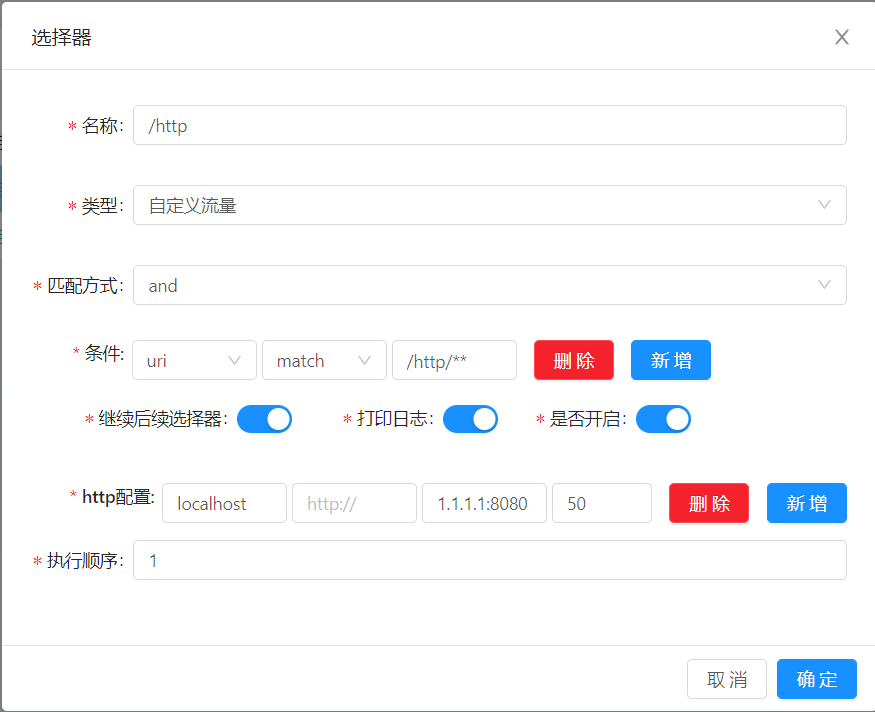sidebar_position: 3 title: Selector Detailed Explanation keywords: [“soul”] description: detailed explanation of selector and rule
Features
Selector and rule are the key point of soul gateway, you can manage any request with it.
This chapter is mainly focus on the concepts of selector and rule and how to use it.
Overview
- One plugin has many selector and a selector has many rules, selector is the first filter of request, and the rule is the final filter.
- Please consider this, it would be perfect when the plugin executes the request until it reached the config value.
- Selector and rule are designed to execute only when the request meet the specific condition.
- Please refer to the previous data structure database design.
Selector

selector detailed explanation:
- name:create your selector with a distinguish name.
- type:custom flow is customized request, full flow is full request. customized request will be handled by the conditions as below, while full request won't.
- match method: you can combine these conditions with ‘and’ , ‘or’ operators.
- condition:
- uri: filter request with uri method and support fuzzy matching (/**).
- header: filter request with request header.
- query: filter request with query string.
- ip: filter request with your real ip.
- host: filter request with your real host.
- post: not recommend to use.
- condition match:
- match : fuzzy string matching,recommend to combine with uri,support restful matching.(/test/**).
- = : if the values are the same, then they match.
- regEx : regex matching,match characters in regex expression.
- like : string fuzzy matching.
- open option:only work with enabled.
- print log:it will print the matching log with the open option enabled.
- execution order:the smaller will have high priorty to execute among multi-selectors.
the above picture means: when the prefix of the request uri is
/testand the value ofmoduleinheaderistest, it will redirect to this service1.1.1.1:8080.selector advice : combine
uriconditon andmatchprefix(/contextPath)as the first request filter.
Rule

when the request was passed by the seletor, then it will be processed by the rule, the final filter.
rule is the final confirmation about how to execute request logically.
rule detailed explanation:
- name:create your rule with a distinguish name.
- match method: you can combine these conditions with ‘and’ , ‘or’ operators.
- condition:
- uri: filter request with uri method and support fuzzy matching (/**).
- header: filter request with request header.
- query: filter request with query string.
- ip: filter request with your real ip.
- host: filter request with your real host.
- post: not recommend to use.
- condition match:
- match : fuzzy string matching,recommend to combine with uri,support restful matching.(/test/**)
- = : if the values are the same, then they match.
- regEx : regex matching,match characters in regex expression.
- like : string fuzzy matching.
- open option:only work with enabled.
- print log:it will print the matching log with the open option enabled.
- execution order:the smaller will have high priorty to execute among multi-rules.
- handle: different plugin has different execution method, pls refer to the specific one.
above picture means: when the request
uriequals to/http/order/save, it will execute based on this rule,load strategy israndom.combine selector means :when the request
uriis/http/order/save, it will be redicted to1.1.1.1:8080byrandommethod.rule advice: combine
uricondition withmatchthe realuri pathcondition as the final filter.
Condition Explanation
uri matching (recommend)
uri matching is based on your request uri, the frontend won't change anything before accessing the gateway.
the
matchfilter method is the same withspringmvcfuzzy matching.in selector,we recommend to match with the prefix of uri, and use the specific path in rule.
when changing the match method, the matching field name can be filled randomly, but make sure the match value must be correct.
header matching
- header matches with your
httprequest header value.
- header matches with your
query matching
it matches the query string in your uri, such as: /test?a=1&&b=2.
so you can add a new condition, choose query method: a = 1.
ip matching
it matches the ip of the http caller.
especially in the waf plugin, if you find some ip is unsafe, you can add a match condition with this ip, then it can't access any more.
if you use nginx proxy before soul, you can get the right ip with refering to parsing-ip-and-host
host matching
it matches the host of http caller.
especially in waf plugin, if you find some host is unsafe, you can add a match condition with this host, then it can't access any more.
if you use nginx proxy before soul, you can get the right ip with refering to parsing-ip-and-host
post matching
- not recommend to use.